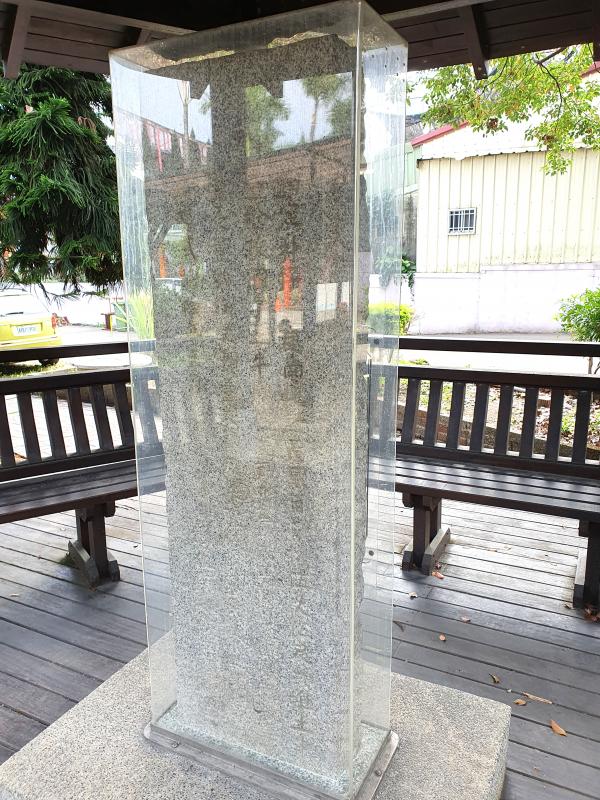The Ministry of Culture on June 4 upgraded the heritage designation of the last remaining marker for a Qing Dynasty boundary between Han Chinese and Aboriginal land on Taiwan proper to “significant.”
The marker, which is in Taichung’s Shihgang District (石岡), was erected in the mid-18th century to delineate the tuniu boundary (土牛界線, a line formed by oxen ditches) around the central mountain range.
Hakka and Minnan people migrating to Taiwan were encroaching on Aboriginal land, so the Qing court prohibited Han Chinese from settling east of the boundary and strictly punished offenders.

Photo courtesy of Taichung Department of Cultural Heritage
On Aug. 1, 2013, the Taichung City Government recognized the Shihgang boundary marker as a “regular heritage item,” but the item is now a nationally recognized “significant heritage item,” the ministry said, adding that the central government would contribute more to the marker’s upkeep and repair.
A cultural heritage review committee yesterday said that the ministry approved the upgrade because of the marker’s significance to policies related to Aborigines in Taiwan and to the history of the nation’s development.
The name tuniu (clay ox) came from the shape of the mounds of earth that formed the ditches along the boundary in some areas, the Taichung Department of Cultural Heritage added.
The ditches, along with natural land formations and stone markers, informed Han settlers where they could farm, conduct business or develop the land, it said.
The policy of allowing Aborigines to have autonomy on their land was first instituted by the Qing court in 1722 and a map of Aboriginal land was drawn in 1735, while the boundary markers were erected over the following decades.
The Shihgang boundary marker was one of 19 markers that were erected in 1761 by then-Changhua County head magistrate Chang Shih-chen (張世珍).

Taiwan is stepping up plans to create self-sufficient supply chains for combat drones and increase foreign orders from the US to counter China’s numerical superiority, a defense official said on Saturday. Commenting on condition of anonymity, the official said the nation’s armed forces are in agreement with US Admiral Samuel Paparo’s assessment that Taiwan’s military must be prepared to turn the nation’s waters into a “hellscape” for the Chinese People’s Liberation Army (PLA). Paparo, the commander of the US Indo-Pacific Command, reiterated the concept during a Congressional hearing in Washington on Wednesday. He first coined the term in a security conference last

Prosecutors today declined to say who was questioned regarding alleged forgery on petitions to recall Democratic Progressive Party (DPP) legislators, after Chinese-language media earlier reported that members of the Chinese Nationalist Party (KMT) Youth League were brought in for questioning. The Ministry of Justice Investigation Bureau confirmed that two people had been questioned, but did not disclose any further information about the ongoing investigation. KMT Youth League members Lee Hsiao-liang (李孝亮) and Liu Szu-yin (劉思吟) — who are leading the effort to recall DPP caucus chief executive Rosalia Wu (吳思瑤) and Legislator Wu Pei-yi (吳沛憶) — both posted on Facebook saying: “I

Sung Chien-liang (宋建樑), who led efforts to recall Democratic Progressive Party (DPP) Legislator Lee Kun-cheng (李坤城), was released on bail of NT$80,000 today amid outcry over his decision to wear a Nazi armband to questioning the night before. Sung arrived at the New Taipei District Prosecutors’ Office for questioning in a recall petition forgery case last night wearing a red armband bearing a swastika, carrying a copy of Adolf Hitler’s Mein Kampf and giving a Nazi salute. Sung left the building at 1:15am without the armband and covering the book with his coat. Lee said today that this is a serious

The Ministry of Economic Affairs has fined Taobao NT$1.2 million (US$36,912) for advertisements that exceed its approved business scope, requiring the Chinese e-commerce platform to make corrections in the first half of this year or its license may be revoked. Lawmakers have called for stricter enforcement of Chinese e-commerce platforms and measures to prevent China from laundering its goods through Taiwan in response to US President Donald Trump’s heavy tariffs on China. The Legislative Yuan’s Finance Committee met today to discuss policies to prevent China from dumping goods in Taiwan, inviting government agencies to report. Democratic Progressive Party Legislator Kuo Kuo-wen (郭國文) said